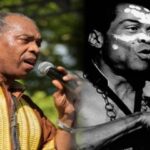A popular musician and recording artiste, Akintunde Brown, says Nigerian musicians cannot win Grammy Award because “we sing in our local dialect and the sounds are poor.”
Brown disclosed this while speaking with the News Agency of Nigeria in Lagos on Sunday. He said:
“We have sounds from different parts of Africa, the mixture will make it a world class sound but we are not complying with that.”
Brown said Nigeria’s hip hop and other genre do not conform to world music standards.
“We also do not use the right nomenclatures which consist of dynamic and partly subjective set of songs, which can be identified by having been performed or recorded by variety of musical acts, often with different arrangements.
“At the Grammy’s, you have a best R&B album category, but someone who calls his music Afro-Soul, or Fuji Blues and some other names in Nigeria cannot win in that category,’’ he said.
He said Sikiru Adepoju who, in 2009, won the “Best World Contemporary World Music Album,’’ won because he was part of Mickey Harts group, Planet Drum US-1991.
“Ayodeji Balogun, popularly known as Wizkid, got a nomination for his contribution to one dance by Drake in the Album of the Year category. That song has been streamed over a billion times, and that is what data brings to the table.
“They create category when they feel like honouring an artiste and their people must be involved,’’ he said.
Brown noted that the genre of music that artistes create in Nigeria cannot blend with what obtains in the international music.
“David Adeleke, aka, Davido; and Olamide Adedeji and their likes do not even stand a single chance to win anything because the beats and sounds are nothing to that of, let’s say Drake or Jay Z.
“Kellerman is a Grammy Award-winning South African flutist, producer and composer who has won seven South African Music Awards, SAMA.
“His Love Language (2015) received a Grammy nomination for Best Contemporary Instrumental Album and won a SAMA for Best Instrumental and/or Classical Album. It debuted at Number 1 on the World Music Billboard charts in July 2015,” he said.
“The album also featured at Number 1 on the ZMR Top 100 International Radio Airplay Chart in August 2015, and spent 11 weeks on the CMJ New World Top 40 Chart, peaking at no 12.
“He used his classical training as a foundation and focused his attention on World Roots music, exploring the versatility of the instrument and fusing classical and contemporary sounds.
“He received a Grammy Award at the 57th Annual Grammy Awards for his 2014 album Winds of Samsara, a collaboration with Indian composer and producer Ricky Kej.
“Winds of Samsara reached Number 1 on the US New Age Album Billboard Charts and also peaked at Number 1 on the Zone Music Reporter Top 100 Radio Airplay Chart in the month of July 2014.’’
The musician said that the economic value of many musicians abroad did not equal that of Nigerian musicians, citing examples of Bruno Mars’ average nightly gross which swelled from $130,000 to $202,000.
“Esperanza Spalding went from $20,000 to $32,000; and Taylor Swift jumped from $125,000 to $600,000.
“They all pay tax in the US, the home of Academy. Their economy does not have anything to gain if an African wins,’’ he said.
He noted that lack of data and lack of good music had been the problem in Nigeria; asking, “Besides Fela, who else has commanded the kind of respect he had?”
He said that Asa could have if she was more intentional with her sound; noting that the female musician risks authenticity with her core fans and that is the French and Europeans.
“They enjoy the flavour in her sound without having them leave their comfort zone, which is classical music,’’ he said.
He claimed that even at home, some awards like Headies, Soundcity and MtV Base, the number one issue comes from the ever changing nature of genres here.
“You can imagine Olamide getting angry because Nasty C won Best Rap Song of the Year. They have to be steady in what they do,’’ he said.
He said that the Grammy organisers don’t have that time.
“I know we will get there, our industry is still in its infancy, but we have to infuse our own sounds in Nigeria with other African countries.
“We need to have that distinct sound, compose them well, infuse them well to make a good meaning that will stand us out.
“But there must be improvement on our music structure, established genre and not limited to time signature as stated above, and majorly label backing,’’ he said.






![Driver Badly Injured After Truck Falls Off Bridge In Lagos [Photos] 7 Driver Badly Injured After Truck Falls Off Bridge In Lagos [Photos]](https://media.kanyidaily.com/2025/04/26152704/Driver-Severely-Injured-As-Truck-Plunges-Into-Commercial-Buses-In-Lagos-150x150.jpg)

![Pope Francis’ Coffin Moved Back To Basilica After Funeral Mass [Photos] 11 Pope Francis’ Coffin Moved Back To Basilica After Funeral Mass [Photos]](https://media.kanyidaily.com/2025/04/26145542/The-coffin-of-late-Pope-Francis-is-carried-by-pallbearers-into-Santa-Maria-Maggiore-Basilica__CorrectionItalyVaticanReligionPopeFuneral-150x150.jpg)

![Trump, Biden, Macron And World Leaders Arrive In Rome For Pope Francis' Funeral [Photos] 15 Trump, Biden, Macron And World Leaders Arrive In Rome For Pope Francis' Funeral [Video]](https://media.kanyidaily.com/2025/04/26115218/images-1-150x150.jpeg)


![Massive Crowd Storms Vatican For Pope Francis' Funeral [Photos] 21 Massive Crowd Storms Vatican For Pope Francis' Funeral [Photos]](https://media.kanyidaily.com/2025/04/26103535/3-crowd-at-VaticanReligionPopeFuneral-150x150.jpg)


